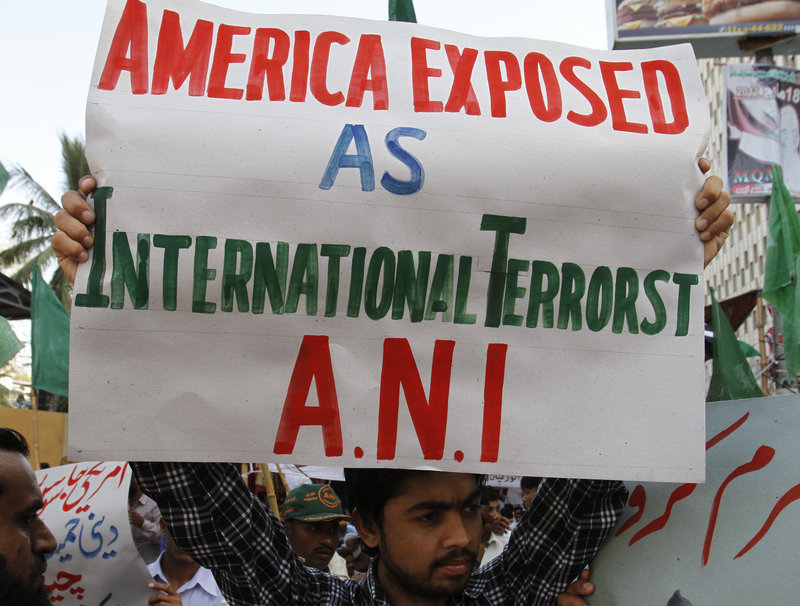LAHORE, Pakistan – A deadly U.S. airstrike Thursday in a northwest tribal village, along with the sudden release Wednesday of a U.S. intelligence contractor accused of murdering two Pakistanis, has raised tensions between the United States and Pakistan and brought new domestic criticism of Pakistan’s security establishment for cooperating with Washington in the war against Islamist insurgents.
Pakistan’s Foreign Ministry summoned U.S. Ambassador Cameron Munter on Friday to protest the missile attack by a CIA drone that killed at least 40 people in North Waziristan.
The government announced that it would boycott an upcoming U.S.-Afghan meeting and issued a statement saying that “the fundamentals of our relations need to be revisited. Pakistan should not be taken for granted nor treated as a client state.”
DISPARATE GROUPS DEMONSTRATE
Over the course of 72 hours, the two events were linked by disparate opposition groups who demonstrated against the U.S. military and spy presence in Pakistan and against national authorities who they say have demeaned the nation’s sovereignty by allowing U.S. planes to bomb Pakistani civilians and U.S. agents to get away with shooting its citizens.
“The Americans are helping our army and our agencies, but they are killing our people,” complained Zahiuddin Baner, a middle–aged engineer who joined a protest here Friday, mingling with turban-clad religious activists. “I have a lot of American friends, but what their government is doing to my country is a disgrace.”
A similar rally Friday in the capital, Islamabad, was led by Imran Khan, an opposition political leader and former cricket champion. Protesters carried placards reading, “Shame on those who released the American killer,” and they pointedly criticized Pakistan’s powerful spy agency, Inter–Services Intelligence.
Neither demonstration drew more than about 2,000 people, which some analysts said was evidence that opponents of the pro-Western government headed by President Asif Ali Zardari are not strong enough to capitalize on public concern about U.S. airstrikes and spying inside Pakistan.
Yet both issues have drawn outrage from across the political spectrum, and protests have drawn women’s rights activists as well as conservative Islamist groups. Friday’s newspapers ran headlines such as “CIA Killer Walks Free” and “Pakistan Furious as US Drones Kill Civilians.”
‘BLOOD MONEY’ DEAL HITS A NERVE
The release of CIA contractor Raymond Davis, who fatally shot two Pakistanis in a still-murky incident Jan. 27, drew protests from Islamic groups even though he was freed through a “blood money” agreement with the victims’ families that is enshrined in Islamic law.
Religious groups said they were suspicious because the deal was made in secret and it was not clear who paid the more than $2 million. The families vanished after appearing in court, and Davis was immediately flown out of the country.
Critics also said that even though the Davis case was resolved to remove a major impediment to U.S.-Pakistani military and intelligence cooperation, it left unanswered the larger questions of why Pakistan has allowed such agents to operate in the country and whether those operations would continue.
Finally, the case struck a nerve in Pakistan because of its contrast with the American legal system’s treatment of Aafia Siddiqui, a Pakistani scientist and alleged terrorism accomplice who was arrested in Afghanistan, accused of trying to pull a gun on a U.S. military guard, and sentenced to 86 years in prison by a U.S. court in New York.
The controversy over U.S. drone attacks has continued for several years, and Pakistan’s military has come under sharp public criticism for tacitly cooperating in the covert U.S. campaign that targets suspected Islamist militants in the Afghan border region. When civilians are killed, Pakistani officials usually issue pro-forma statements of concern.
Last week, however, official reaction to the missile strikes in Datta Khel village was angry, forceful and immediate. The army chief, Gen. Ashfaq Kayani, said civilians were “carelessly and callously targeted with complete disregard for human life.” Prime Minister Yousaf Raza Gillani said the attack was counterproductive in the battle against terrorism.
Pakistani officials were embarrassed by the timing of the attack, one day after Davis was freed, and angered by reports that civilians gathered to discuss local land issues had been among the 40 or more killed.
Yet the unofficial U.S. response, in anonymous comments made by an American official Thursday, was a rejection of the Pakistani version of events, suggesting just how low relations between the countries have sunk. The official said that there was “every indication this was a group of terrorists, not a charity car wash in the hinterlands.”
Send questions/comments to the editors.



Success. Please wait for the page to reload. If the page does not reload within 5 seconds, please refresh the page.
Enter your email and password to access comments.
Hi, to comment on stories you must . This profile is in addition to your subscription and website login.
Already have a commenting profile? .
Invalid username/password.
Please check your email to confirm and complete your registration.
Only subscribers are eligible to post comments. Please subscribe or login first for digital access. Here’s why.
Use the form below to reset your password. When you've submitted your account email, we will send an email with a reset code.